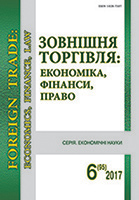The genesis of scientific thought concerning the economic nature of the interest rate
Keywords:
interest, interest rate, commodity-money relations, monetary policyAbstract
Background. The view that there is no more vivid evidence of the welfare of the nation than a low interest rate is dominated among scholars and practitioners of finance. Interest rate dynamics is the most important financial indicator used by economic entities in making decisions in economic activity.
Analysis of recent research and publications. The category of interest was studied from ancient times by philosophers, in particular Aristotle and Thomas Aquinas. K. Marx paid a considerable attention to the category of interest in his studies. In the twentieth century, such scientists as John Keynes, Milton Friedman, Irving Fisher, John Hicks and Mark Blaug have devoted their scientific works to the problem of interest study. Among the domestic researchers, V. Basilevich, N. Grazhevskaya, P. Leonenko, T. Gaiday, O. Nesterenko, A. Maslov, L. Lazebnik, N. Dumenko, B. Lanovik, Z. Matysiakevych, R. Mateyko addressed the subject.
The aim of the study is to analyze the evolution of the category of interest and its relationship with the economic, political and social development of society.
Materials and methods. The works of foreign and domestic scientists became the informative basis for the study. The author used the historical method of research to analyze the process of emergence of the definition «interest», statistical – for the interpretation of nominal and real interest rates, the method of social supervision – to analyze the results of the introduction of individual recommendations of known economists.
The results of the research. Modern economic theory defines interest as the price of money services. It is generally accepted that interest is interpreted as the price of loan capital, the investor's income from investing for specified goals and the period of time inthe future. The complexity and versatility of the economic category of interest is due to a wide spectrum of views on it among economists due not only to the spread of credit relations, but also to the change in thesocio-economic system and political structure of society.
Conclusion. Various interpretations and a wide range of views on the interest rate are due to the evolution of the credit relations of a society, the analysis of which provides an idea of the origin of interest, which has long been considered a reimbursement tothe lender, and subsequently accepted as its perception as the price of capital, which is relevant to this day. The generalization of theories of various scholars is important in the study of economic processes and the principles of monetary policy. The development of the financial sector in the 20th century and the active functioning of financial markets led to the need to develop the monetary policy of the central bank and to apply its key component – interest policy, which is based on interest rate as a means of influencing and regulating economic processes.
References
Kejns Dzh. M. Obshhaja teorija zanjatosti, procenta i deneg : per. s angl. M. : Gelios, 2002. 352 s.
Fridmen M. Kolichestvennaja teorija deneg. M. : Jel’f-Press, 1996. 86 s.
Blaug M. Great Economists Before Keynes: A Introduction to the Lives and Works of 100 Economists of the Past. Cheltenham : Elgar 1997. URL : http://www.worldcat.org/title/great-economists-before-keynes-an-introduction-to-the-lives-and-works-of-onehundred-great-economists-of-the-past/oclc/901103581 ?referer=di&ht=edition.
Vajntraub S. Hiksianskoe kejnsianstvo: velichie i upadok. Sovremennaja jekonomicheskaja mysl’. M. : Progress, 1981. S. 91–121.
Blaug M. Ekonomichna teorija v retrospektyvi ; per. z angl. I. Dzjub. Kyi’v : Osnovy, 2001. 670 s.
Bazylevych V. D., Grazhevs’ka N. I., Leonenko P. M., Gajdaj T. G., Nesterenko O. P., Maslov A. O., Vernygora L. V. Istorija ekonomichnyh uchen’. Kyi’v : Znannja, 2004. 1300 s.
Lazebnyk L., Dumenko N. Ekonomichnyj zmist bankivs’kogo procentu: istorychna retrospektyva. Visnyk Kyi’vs’kogo nacional’nogo un-tu im. Tarasa Shevchenka. 2014. № 10 (163). S. 35–39. Serija : Ekonomika.
Lanovyk B. D., Matysjakevych Z. M., Matejko R. M. Ekonomichna istorija Ukrai’ny i svitu. 3-tje vyd., dopov. Kyi’v : Vikar, 1999. 719 s.
Shlisser Je. Jekonomicheskaja teorija i jeksperiment: Isaak N’juton, Milton Fridmen i Veron Smit. Voprosy jekonomiki. 2007. № 3.



